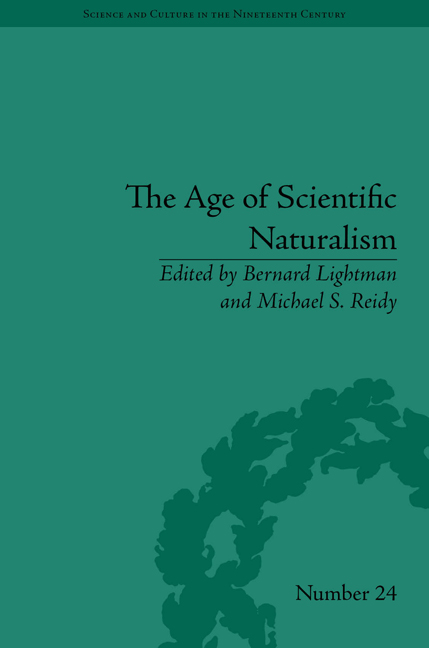Book contents
- Frontmatter
- CONTENTS
- Dedication
- Acknowledgements
- List of Contributors
- List of Figures
- Introduction: John Tyndall, Scientific Naturalism and Modes of Communication
- Part I John Tyndall
- Part II Scientific Naturalism
- 4 Herbert Spencer and the Metaphysical Roots of Evolutionary Naturalism
- 5 Evolutionary Mathematics: William Kingdon Clifford's Use of Spencerian Evolutionism
- 6 The ‘Great Plan of the Visible Universe’: William Huggins, Evolutionary Naturalism and the Nature of the Nebulae
- 7 Alfred Newton: The Scientific Naturalist Who Wasn't
- Part III Communicating Science
- Notes
- Index
5 - Evolutionary Mathematics: William Kingdon Clifford's Use of Spencerian Evolutionism
from Part II - Scientific Naturalism
- Frontmatter
- CONTENTS
- Dedication
- Acknowledgements
- List of Contributors
- List of Figures
- Introduction: John Tyndall, Scientific Naturalism and Modes of Communication
- Part I John Tyndall
- Part II Scientific Naturalism
- 4 Herbert Spencer and the Metaphysical Roots of Evolutionary Naturalism
- 5 Evolutionary Mathematics: William Kingdon Clifford's Use of Spencerian Evolutionism
- 6 The ‘Great Plan of the Visible Universe’: William Huggins, Evolutionary Naturalism and the Nature of the Nebulae
- 7 Alfred Newton: The Scientific Naturalist Who Wasn't
- Part III Communicating Science
- Notes
- Index
Summary
By the end of the 1870s in Britain, scientific naturalism had coloured a plethora of popular and expert-led debates regarding the origins of the universe, the development of organic matter, the dissipation of energy and even the adoption of new mathematics in geometry and algebra. While the ‘gentlemen of science’ in natural philosophy and natural history, such as John Herschel, Charles Lyell and William Whewell, had worked to ensure a permanent place for God in the order of things, by maintaining that natural laws are not absolute though they are uniform, agnostics such as Thomas Henry Huxley and John Tyndall worked to eliminate God from the story of cause-and-effect entirely. The question of uniformity in nature became a point of departure for a number of scientific and philosophical participants in the evolutionary debates that defined Victorian science in the 1860s and 1870s. William Kingdon Clifford played a significant role in those debates. As a mathematician, he developed unusual views with regards to the role of evolutionism in mathematical knowledge. Specifically, Clifford developed a philosophy of mathematics indebted to Herbert Spencer's understanding of the integration and differentiation of matter over generations of species.
Clifford as an Evolutionary Mathematician
As a graduate of Cambridge University's Tripos mathematical system, Clifford was embroiled in debates over the implications of the uniformity of nature from the outset of his academic career.
- Type
- Chapter
- Information
- The Age of Scientific NaturalismTyndall and his Contemporaries, pp. 89 - 112Publisher: Pickering & ChattoFirst published in: 2014



